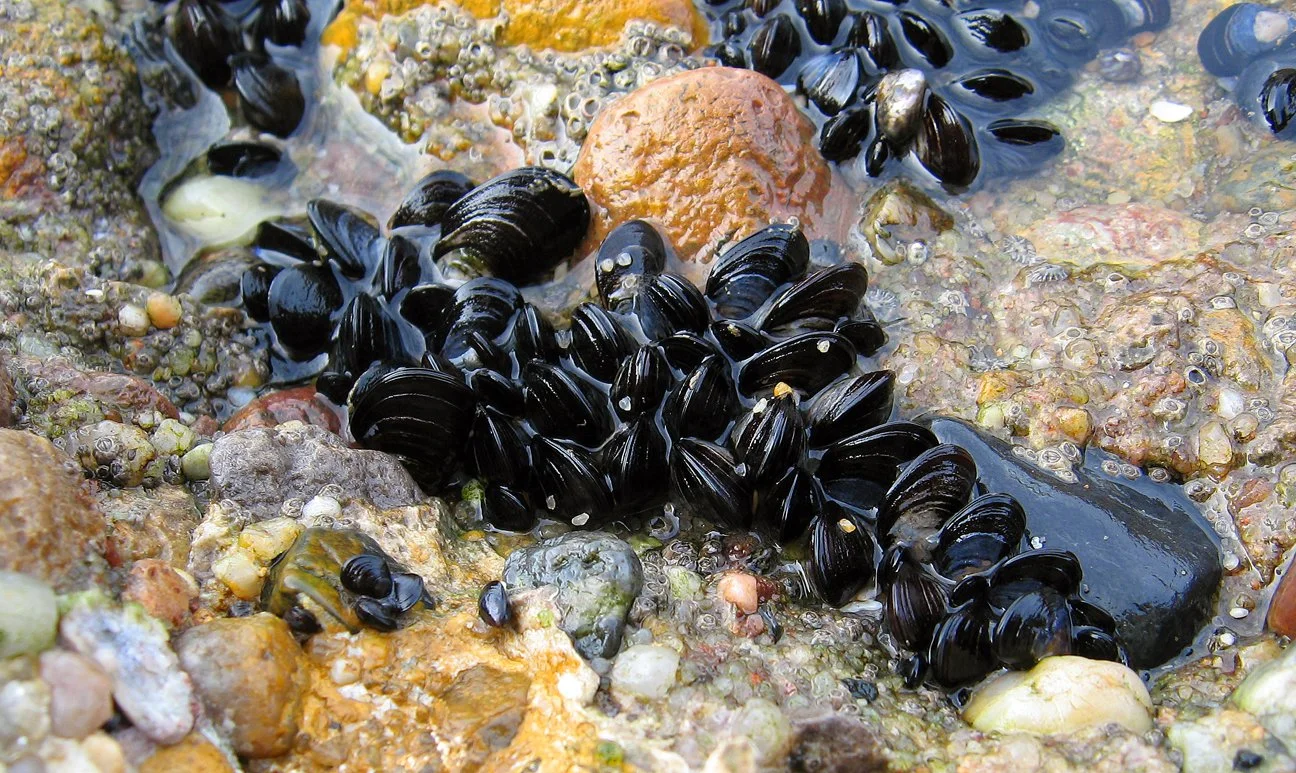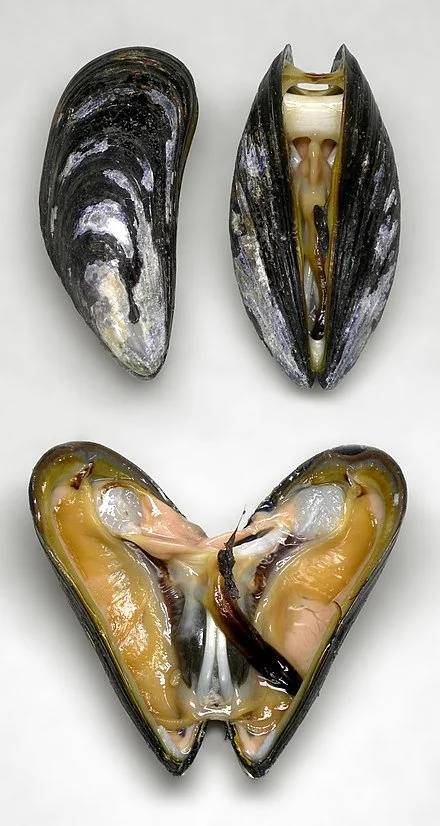Colleen Cronin: The big potential of shellfish aquaculture
Live blue mussels on a rocky substrate
— Photo by Andreas Trepte
From ecoRI News (ecori.org)
The sound of thousands of mussels moving on conveyor belts and clanking through sorting machines almost drowned out Greg Silkes as he tried to explain how the shellfish get from the ocean, through the processing plant, to plates around North America.
Silkes is the general manager American Mussel Harvesters, one of the largest mussel producers in North America, and he helps run the business along with his father and other family members. On Wednesday, the Silkes and America’s Seafood Campaign hosted U.S. Sen. Jack Reed (D-R.I.), and other officials and seafood stakeholders at their location in North Kingstown, R.I., to discuss the shellfish-farming industry and its importance to public health, the economy, and reducing carbon emissions.
American Mussel Harvesters has been around since 1986 and has grown from a small operation with one boat and one phone to a large enterprise that ships mussels, clams, and oysters around the country.
Rather than fishing from pockets of naturally occurring shellfish on the seafloor, American Mussel Harvesters grow their product from tiny seeds in lots in the ocean. Greg Silkes said that a bag about the size of a shoe box can store millions of itty-bitty shellfish.
Overall, it takes about two to four years to get the shellfish from seed to table, but, depending on the maturity of the seeds American Mussel Harvesters buys, it usually takes six to eight months to grow and process their product and get it on the market.
As workers sorted the mussels into different grades, packed them into netted bags, and placed them in boxes filled with ice, Silkes said the shipment would be headed to a nearby Market Basket.
In the last two years the business model has shifted away from restaurants and toward retail because of the pandemic, Silkes said, and they’ve automated more of their processing plant to accommodate that change.
Still, American Mussel Harvesters does sell to local restaurants. “I love going to eat and saying this is my product,” Silkes said.
Later, on a boat specifically outfitted for shellfish harvesting, the group, which included several members of the Silkes family, Reed, and representatives from National Oceanic and Atmospheric Administration (NOAA), Rhode Island Department of Environmental Management (DEM), the Rhode Island Food Policy Council, and East Coast Shellfish Growers Association, sat down for a round table discussion about the industry.
Bill Silkes, the owner and founder of American Mussel Harvesters, started off the discussion thanking Reed for his work to promote shellfish farming in Rhode Island. “Under your watch,” Rhode Island’s gone from zero to more than 40 farms, Silkes told the senator.
Reed noted that it’s an important industry “not just to Rhode Island, but to the entire nation.”
According to the Commercial Fisheries Research Foundation, in R.I., the fisheries and seafood sector — which includes commercial fishing and shellfishing, fishing charters, processing, professional service firms, retail and wholesale seafood dealers — consists of 428 firms that generated 3,147 jobs and $538.33 million of gross sales in 2016. Including spillover effects across all sectors of the R.I. economy, the total economic impact was 4,381 jobs and an output of $419.83 million. The Port of Galilee alone hosts 240 fishermen that bring in 48 million pounds of seafood annually.
As the industry continues to grow, Bill Silkes said, a lack of dock space and growing space will impact local businesses. Indicating the vessel hosting the round-table talk, Silkes said it had already been kicked out of a slip once to accommodate a yacht.
He also noted efforts to start moving farming into federal waters, something that has made more progress in the last few months than in previous years.
“The opportunity is enormous,” he said.
Assistant administrator for NOAA National Marine Fisheries Service Janet Coit said she’s been working to get aquaculture out of state waters and that part of the challenge is that permitting will involve several different groups.
Coit, the former DEM director, said she sees the “same issues” federally in getting farms up and running as there were in Rhode Island, “just at a different scale.”
Bob Ballou, assistant to the director of DEM, talked about RI Seafood, the state-run marketing campaign designed to get more Rhode Islanders eating local catch.
Ballou said the campaign not only supports the seafood industry, it also provides economic, public health, food security, and environmental benefits in a “win-win-win-win-win” situation.
Seafood produces six times less than the carbon emissions of beef, said Diane Lynch, president of the Rhode Island Food Policy Council, so shifting protein consumption toward foods like shellfish and away from cattle could help to mitigate the effects of climate change.
“We’re just slowing [climate change] down, it’s too late to stop… but we have to do much, much more,” Reed said, adding that the seafood industry is “much kinder to the environment than some other folks.”
Linda Cornish, president of the Seafood Nutrition Partnership, added that on top of the other benefits, seafood is a valuable nutritional resource and may contribute positively to mental health.
At the end of the discussion, Mason Silkes brought out fresh oysters and showed Reed how to shuck them while the group slurped them down.
Colleen Cronin is a Report for America corps member who writes about environmental issues in rural Rhode Island for ecoRI News.

